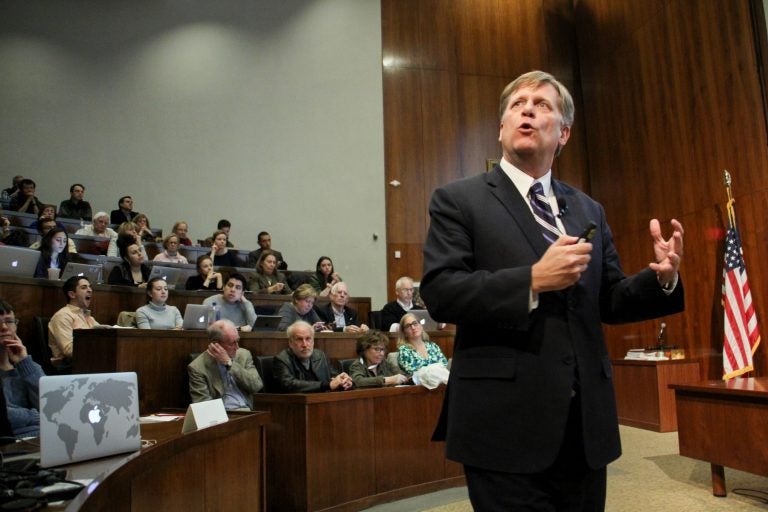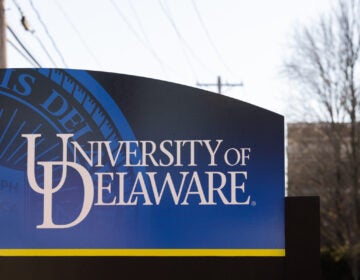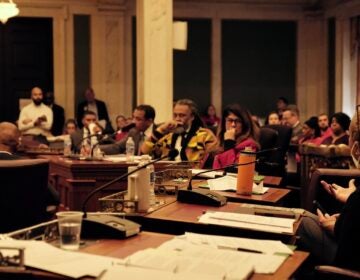In Princeton talk, former ambassador to Russia urges ‘strategic patience’
Time of 'hot peace' is frightening, but not as scary as Cuban missile crisis of 1962, diplomat says.

Former U.S. Ambassador to Russia Michael McFaul shares his insights on recent developments in the U.S.-Russia relationship during a talk at Arthur Lewis Auditorium, Robertson Hall on the Princeton University campus. (Emma Lee/WHYY)
“What I want to convey to you is that it’s pretty bad. Most certainly, some elements of our moment today are worse than some of the more cooperative periods during the Cold War,” former ambassador to Russia Michael McFaul told a packed auditorium at Princeton University’s Woodrow Wilson School Wednesday.
Before his talk, former ambassador McFaul addressed President Donald Trump’s tweets about Russia and Syria.
Trump tweeted Wednesday that relations between the U.S. and Russia are worse than they were during the Cold War. He also tweeted that Russia shouldn’t partner “with a Gas Killing Animal who kills his people and enjoys it,” referring to the apparent poison gas attack that killed dozens in Douma, Syria, Saturday. He threatened Russia with a potential missile strike: “Get ready Russia, because they will be coming, nice and new and ‘smart!’ ”
Trump’s tweets came hours after Russia’s ambassador to Lebanon, Alexander Zasypkin, told Hezbollah’s al-Manar TV that any U.S. missiles would be shot down, and launch sites would be targeted. Speaking in Arabic, Zasypkin also said a clash “should be ruled out and therefore we are ready to hold negotiations,” Reuters reported. Zasypkin’s remarks were quoting Putin, said NPR’s Lama Al-Arian, reporting from Beirut.
“One of the things that worries me right now, especially with the president’s tweets today,” said McFaul, “is that the best way to be communicating with the Russians? It leaves a lot of opportunity for misperception. And no matter what, we have to fight against misperception.”
McFaul, now a professor of political science and the director of the Freeman Spogli Institute for International Studies at Stanford University, served as the ambassador to Russia in the Obama administration from 2012 to 2014. Before that post, he worked as the senior director for Russian and Eurasian Affairs at the National Security Council in the Obama White House from 2009 to 2012. His new book, “From Cold War to Hot Peace: An American Ambassador in Putin’s Russia,” describes how we got here.
“I’m most certainly very worried about what I call the ‘hot peace’ today: That things are scary, confrontation is high, and communication between our two countries is pretty low,” McFaul said. He said that the period of détente was a time of increased cooperation.
Still, he said, today’s “hot peace” is not as frightening as the Cuban missile crisis of 1962.
“The good news, if you believe my story,” McFaul said, “is there’s no master design to recreate the Soviet Union here. It’s a tactical response to very concrete events driven mostly by demonstrators. There’s no march for further annexation as part of some grand scheme. Putin’s not sitting there, looking at some map, thinking how he can take this territory, and that territory. I don’t believe that.”
“Nor do I believe that the balance of power or history or culture — these kind of innate structural forces — compel us to be competitive or confrontational or, worse yet, to go to war with Russia because of deeper structural things,” he continued.
Yet, he said, many factors indicate that there’s reason to worry — from Russia’s nuclear capabilities to its status as a true economic power.
“We underestimate it,” the former ambassador said. “The idea that Russia’s going to wither away is just incorrect. They’re back as an economic power, if not a global power.”
McFaul’s book argues that U.S.-Russia relations are driven by individuals making decisions, not big, structural divisions. That means a turn toward democracy could happen fast — but not while Putin’s in power. McFaul closed his talk by recommending one solution in particular, a policy he called “strategic patience.”
WHYY is your source for fact-based, in-depth journalism and information. As a nonprofit organization, we rely on financial support from readers like you. Please give today.





